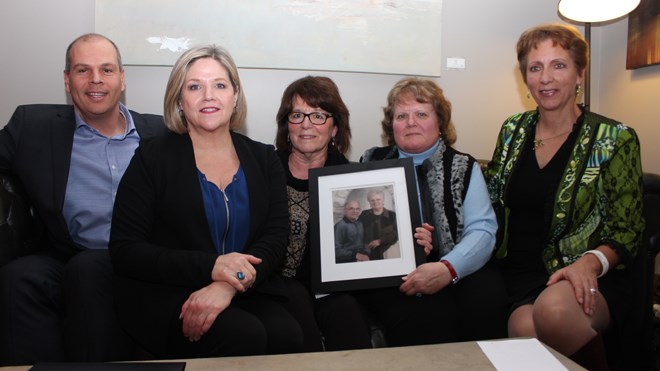Ontario NDP leader Andrea Horwath says it's time for the Ontario government to take a long, hard look at the province's long-term care system.
Horwath was in Sudbury on Jan. 19 and was joined by Nickel Belt MPP France Gélinas and Sudbury NDP candidate Jamie West for a sit down with Linda Adler and Helga Leblanc, who shared their story about Adler's inlaws and Leblanc's parents.
The couple, Gottfriend and Hildegard, have been separated for nearly six months while Hildegard waits for a space to open at Finlandia Village.
Gottfried (91) and Hildegard (88) have been married for 67 years and Gottfriend was entered into long-term care at Finlandia last September. Hildegard, however, is still on a waiting list and has been bumped down in favour of crisis patients.
Adler and and her husband approached Gélinas with their concerns, as the transition has been difficult on both of her in-laws.
"Her mom is having a really tough time, she misses her husband, she's worried and they want to be together," said Gélinas.
The couple lived together in their own home with some help from family members and personal support workers up until last August when Hildegard fell and broke her pelvis and was admitted to Health Sciences North.
"A few weeks after that my dad became very depressed at home and he was not eating and his personal hygiene went downhill," said daughter Helga Leblanc. "The doctor became quite concerned and declared him in crisis and at the end of September he got placement at Finlandia. He's quite happy there, but he misses mom desperately, he says he misses her smell and when she goes to visit he grabs her by the hand and they hold hands."
During her recovery, Hildegard transitioned to ALC (alternative level care) and was initially labeled as level four on the wait list for a spot at Finlandia. That was quickly changed and Hildegard was bumped up to level two due to the province's spousal reunification program, which gives priority to people whose spouses are already in long-term care.
Level one is reserved for those people who are labelled as crisis patients, as Gottfried was when he was given a spot at Finlandia.
"We thought this was wonderful, and about two months ago mom was No. 1 on the list, we had all her bags packed at home to bring to Finlandia then all of a sudden we heard she is now No. 6 on the list," said Leblanc.
"They were putting people in crisis above mom and what I was told by someone at Finlandia is that the government was pressuring the hospital to get long-term ALC patients out of the hospital and these patients were being declared in crisis and going above mom."
Stories like this are not unfamiliar to Horwath who says that there is a larger systemic issue at hand and that wait lists for couples to be reunited in Ontario’s long-term care system should be part of a broad public inquiry into the problems in Ontario’s long-term care system – a public inquiry Horwath has vowed to launch, if she wins the June election.
"This helps us put real people into what we think is a big policy issue," said Horwath. "We know that there's a crisis in long-term care and there has been for a long time. We know that there's some 32,000 people on the wait list for long-term care in Ontario. You can see that this situation with Hildegard and Gottfried is absolutely unacceptable. No families should have to be going through this kind of crisis because their government has not taken care of keeping our long-term care system at a level that it should be at."
Of the 32,000 people on the long-term care wait lists, 1,133 are waiting in the Sudbury-Manitoulin area, compared to the 1,631 long-term care spaces in the region.
Since June of last year, Horwath has been calling for a full public inquiry into the state of long-term care, a find-and-fix mission which she says can be undertaken as a second phase of the public inquiry into the circumstances surrounding Elizabeth Wettlaufer's murders.
Horwath also commented on recent news of a nearly 150-per-cent spike in violence in Ontario's long-term care homes between 2011 and 2016. In her conversation with Adler and Leblanc, Howath noted that no one is blaming frontline workers for the issues with the long-term care system and said that this falls at the feet of Kathleen Wynne and the Liberals.
"There's a couple of pieces to this puzzle," Horwath said. "There's no doubt that there has been an increase of violence against patients that has been documented, but as was described by Linda (Adler), the bottom line is government has been starving the long-term care system, the workers in that system are being run off their feet.
"When people who are trusted caregivers are being abusive toward residents in long-term care that is absolutely not acceptable and there's no excuse for it. On the other hand, when you're a government, you have a responsibility to make sure that the services that are provided to our most vulnerable seniors are services that we can feel good about, that are high-quality and provided them with the care and dignity that they need."
This week, a ruling issued by Justice Eileen Gillese, Commisioner of the Wettlaufer Inquiry, stated that the inquiry now underway is restricted to events directly ties to the Wettlaufer murders — excluding those who have relatives and friends in long-term care, along with those who work in long-term care.
"What an opportunity the Wynne government has missed here," said Horwath. "We need a second phase to this public inquiry, immediately. We should be looking at systemic issues in long-term care, including safety of residents and staff, quality of care, funding levels, staffing levels, enforcement and inspection and the incidence of violence in long-term care homes.
